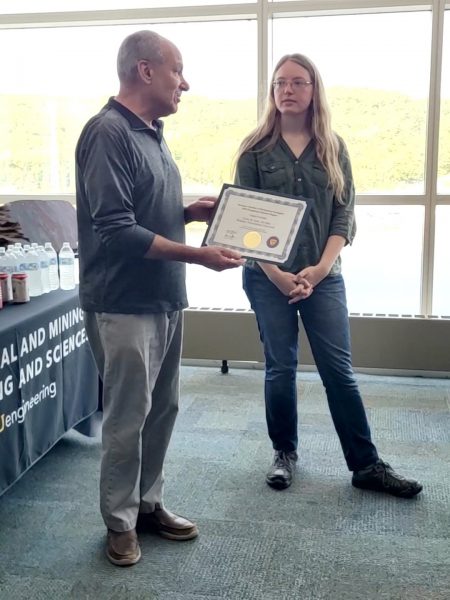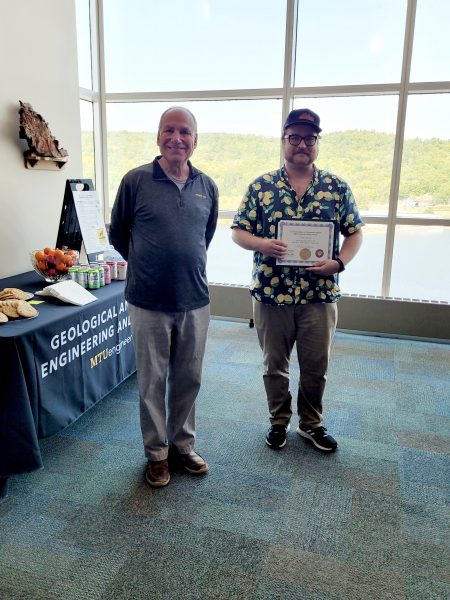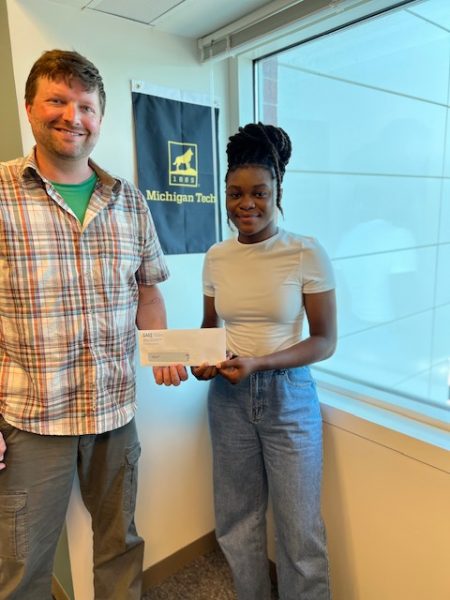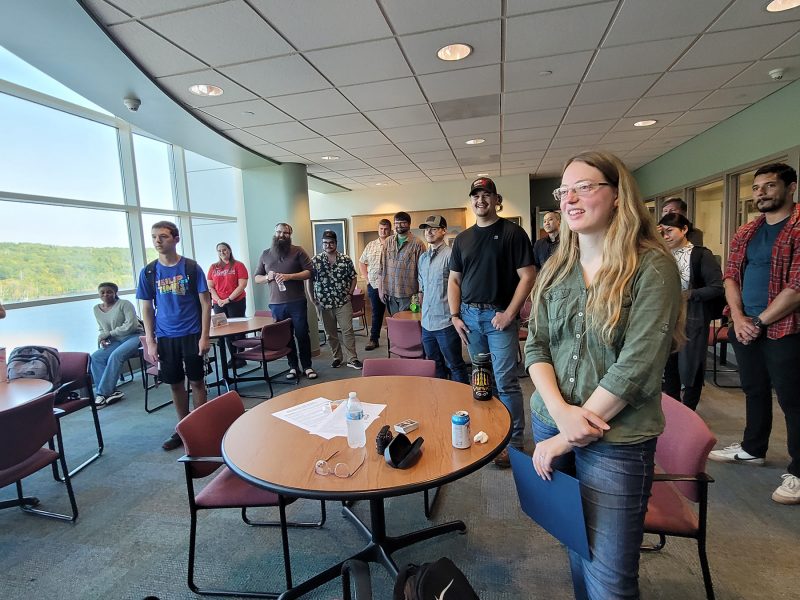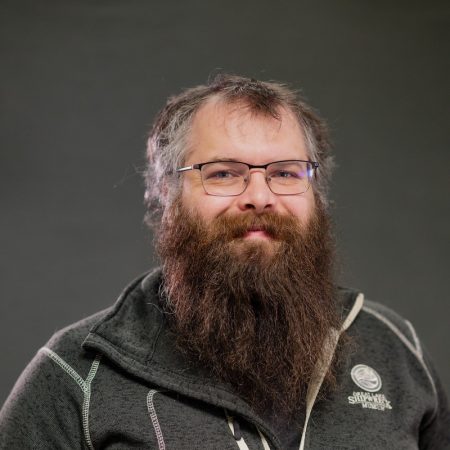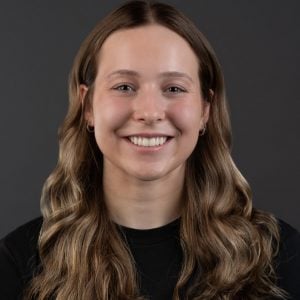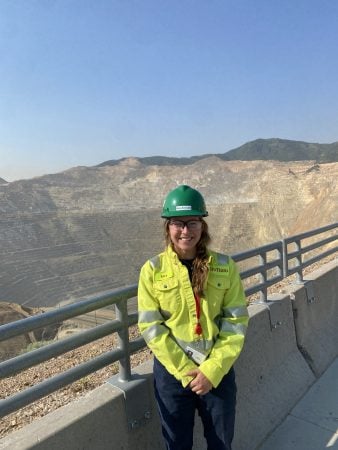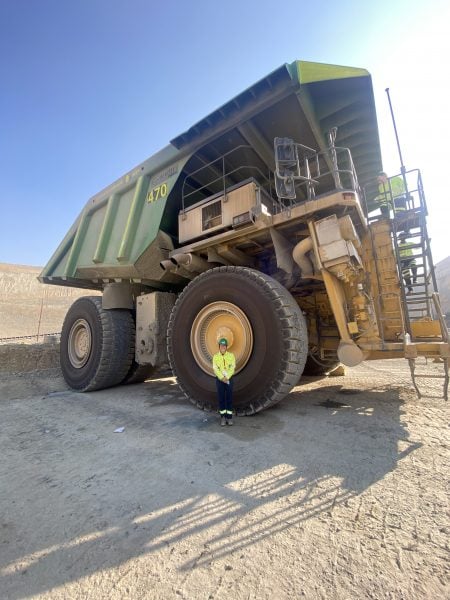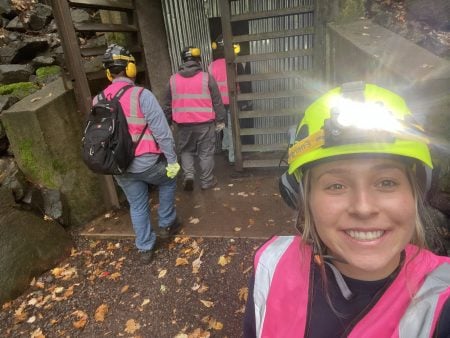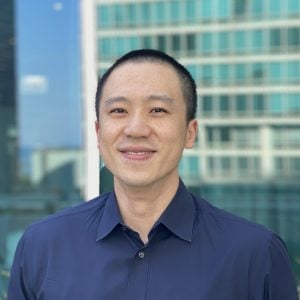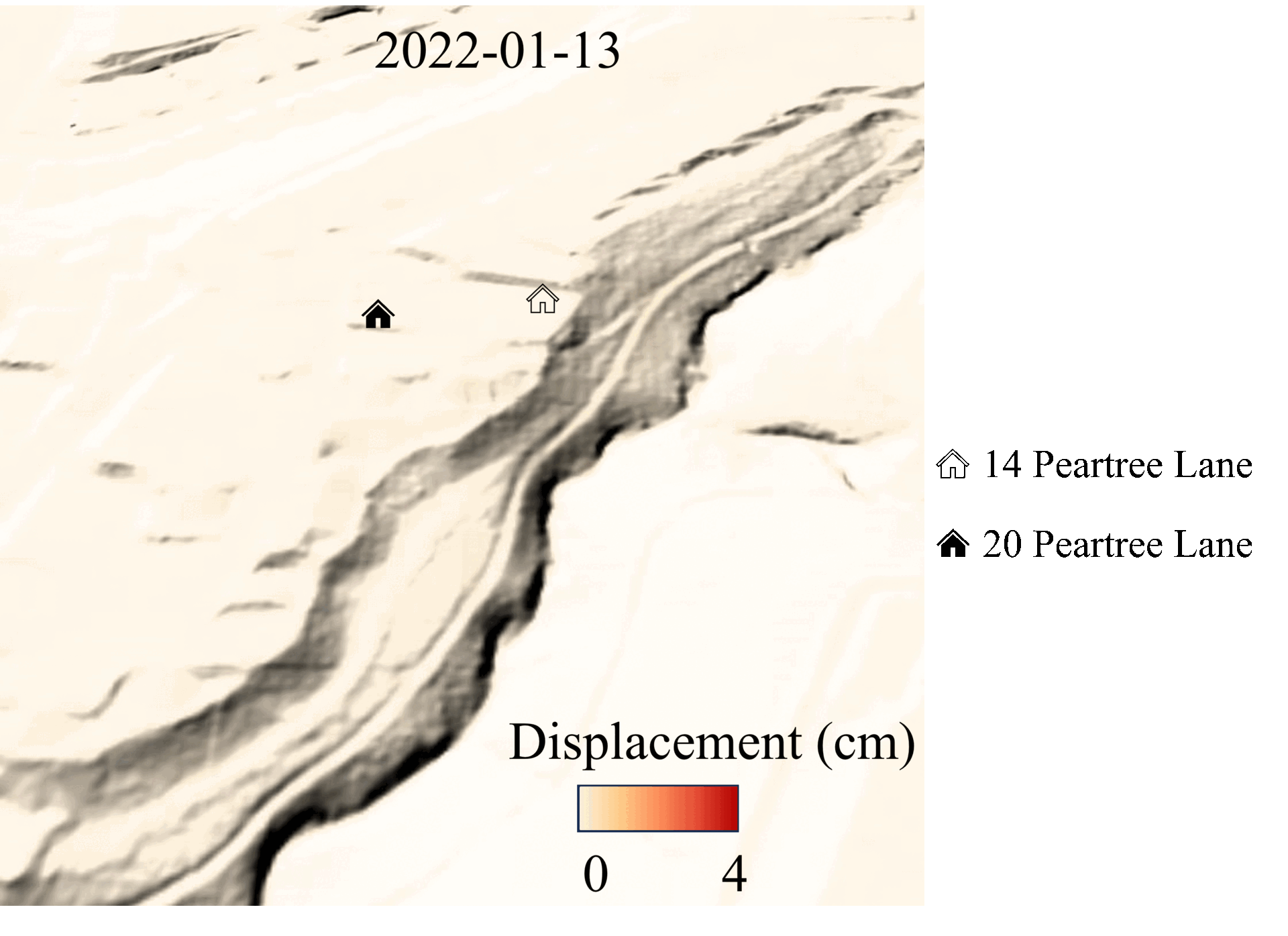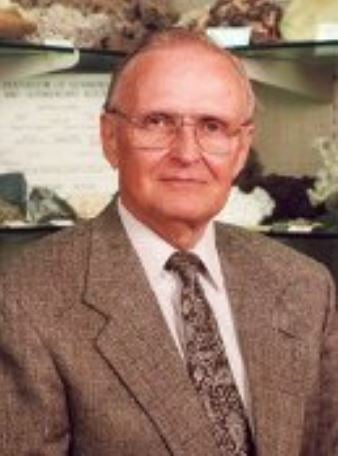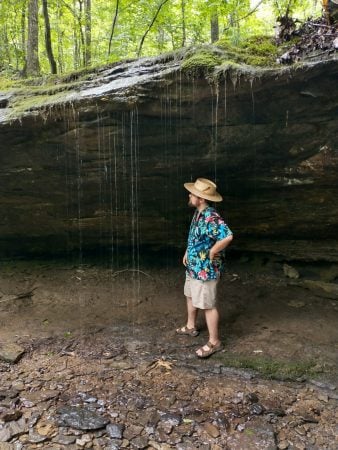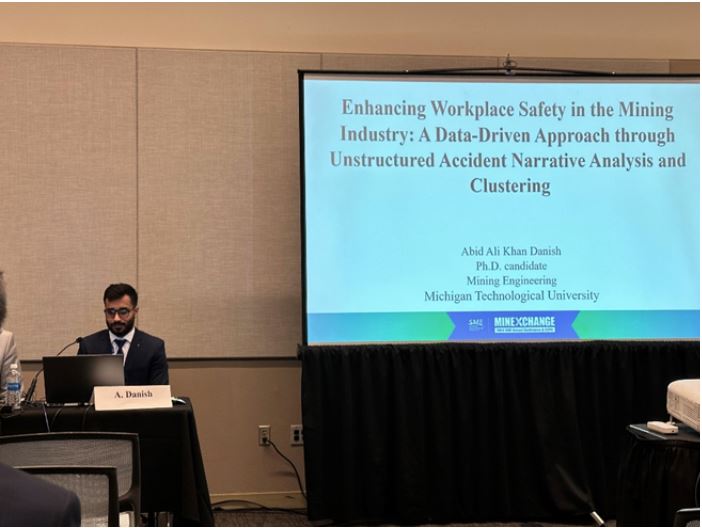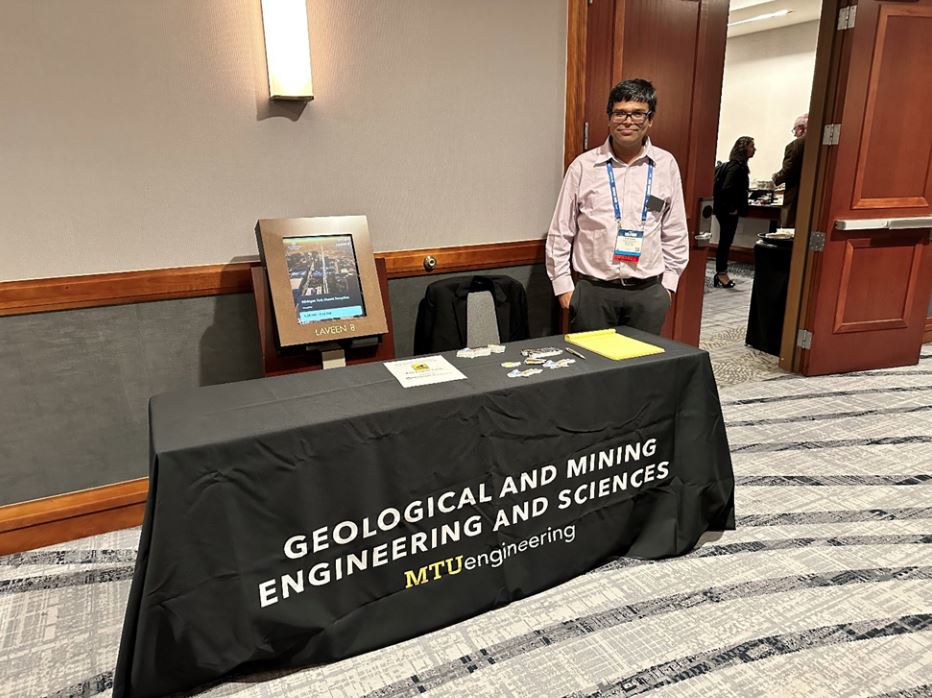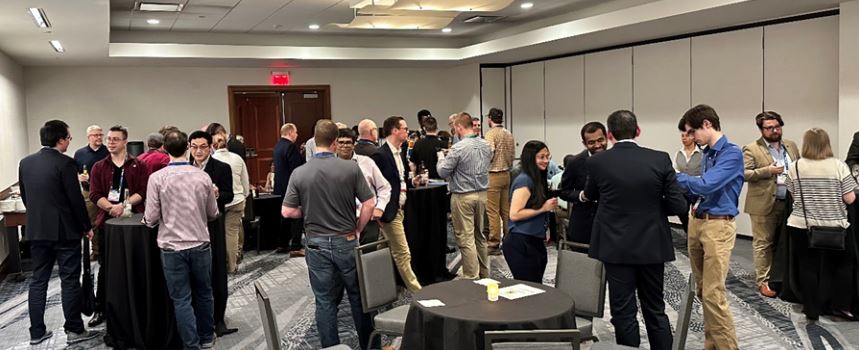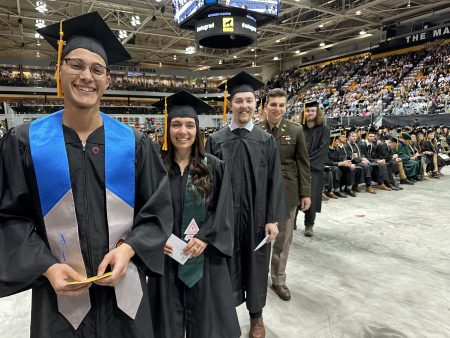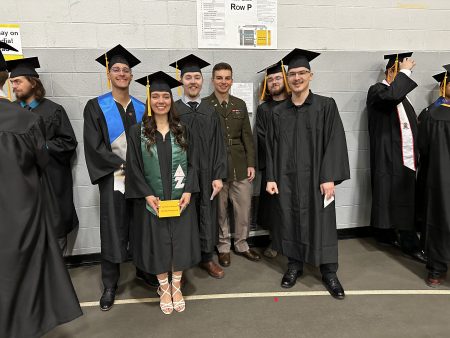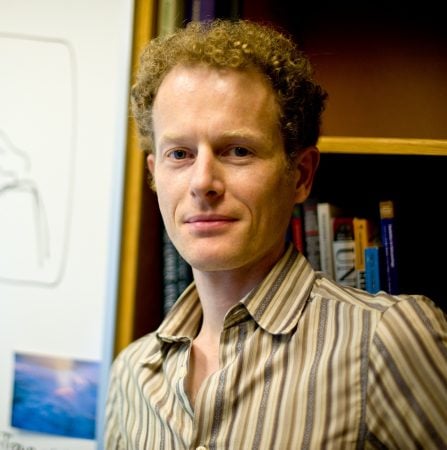The Department of Geological and Mining Engineering and Sciences (GMES) celebrated the achievements of our students and faculty at a recognition ceremony held on September 13, 2024, in the GMES atrium. We were delighted to welcome our special guests, David Adler (Geology ’82) and his wife, Martha. David has been an invaluable supporter of our American Institute of Professional Geologists (AIPG) student chapter, and this time, he joined us to present several AIPG awards.
We congratulated Konraad VanDyke (Geology ’26), honored with the Andrew Mozola Memorial Scholarship, and Natalie Sorensen (Geological Engineering ’26), who received the AIPG National Undergraduate Scholarship.
The AIPG student chapter was recognized with the 2023 Excellent Chapter Award, and certificates were presented to the chapter’s past leadership: President Grace Griffin (Ojala), Vice President Maxwell Stange, Secretary Anton Smirnov, and Treasurer Emilie Pray.
We also celebrated the AggCelerate student team for their outstanding achievement in reaching the top six nationally in the final phase of the Society for Mining, Metallurgy, and Exploration (SME)/National Stone, Sand, and Gravel Association (NSSGA) Student Design Competition at the 2024 Annual SME Conference & Expo in Phoenix, AZ. The interdisciplinary Michigan Tech team, advised by Dr. Nathan Manser, professor of practice, included mining engineering majors Aiden Harmon, Lucas Maxon, Ian Repic, Nathan Seidel, Grady Williams, and geological engineering junior Cassie Burch.
Other students recognized included Alice Schmaltz (Mining Engineering, ’25), recipient of the prestigious 2024 Copper Club Scholarship, and Rapheka Targbwe (MS student in Mining Engineering), who received competitive scholarships from the Woman’s Auxiliary to the American Institute of Mining and Metallurgical Engineers (WAAIME), a division of SME.
We also cheered for Gustavo Bejar Lopez for his success in winning the Three Minute Thesis competition and securing a National Geographic Explorer Grant last fall.
Additionally, we welcomed two new members to the department: Xiang Li, our new assistant professor of geological engineering, and Matt Laird, our new academic advisor.
The event was filled with engaging conversations, and everyone enjoyed the refreshments, which included cookies, fruit, and soft drinks. It was a wonderful time for all.
We are excited to welcome our new Academic Advisor, Matt Laird, who joined the Department of Geological and Mining Engineering and Sciences (GMES) this fall! In addition to advising, Matt will serve as the liaison with the Essential Education program and participate in our recruitment and outreach efforts.
He holds a B.S. degree in Applied Geophysics and an M.S. degree in Geophysics from Michigan Tech. Being an alumnus of our department, Matt is well-acquainted with our science and engineering programs.
Matt brings extensive experience successfully working with diverse populations of students as a college academic advisor, instructor, and high school math and physics teacher. He is particularly passionate about helping students navigate their academic journeys and explore career opportunities in geoscience.
“I’m thrilled to be back at Michigan Tech and to have the opportunity to give back to the community that shaped my own academic and professional path,” Matt shared. “I’m looking forward to connecting with students and supporting them in achieving their goals.”
In addition to his role with GMES, Matt will also serve as an academic advisor for the Department of Civil, Environmental, and Geospatial Engineering (CEGE), and will collaborate with the College of Engineering on recruitment activities.
Outside of work, Matt enjoys reading and music, as well as hiking and exploring the natural beauty of the Upper Peninsula, which he believes enriches his connection with the field of geoscience.
Please join us in welcoming Matt to the team!
We are thrilled to extend our heartfelt congratulations to Alice Schmaltz, a fourth-year mining engineering student in the Department of Geological and Mining Engineering and Sciences, who has been awarded the prestigious and highly competitive Copper Club Lord Bagri Scholarship!
The Copper Club, Inc., founded in 1944, is the leading organization for networking, educational grants, and events within the copper industry. The Copper Club Scholarship Fund provides scholarships to students majoring in geoscience or other fields related to the production of copper or copper products. This highly competitive award is granted to students who demonstrate exceptional merit, as evidenced by their outstanding academic performance.
This summer, Alice completed an internship with Rio Tinto’s underground mine planning team at the Kennecott mine in Salt Lake City. Reflecting on her experience, she shared: “This experience was packed with a lifetime’s worth of opportunities and experiences. Through my internship project, I had the chance to collaborate with and learn from some of the industry’s brightest minds. I am so grateful for the community and camaraderie that made this journey so memorable and impactful.”
Alice’s award is the latest addition to the roster of GMES students who have earned this honor (https://www.copperclub.org/scholarships-awards/).
Congratulations, Alice, on your well-deserved achievement!
Dr. Xiang Li, who will join GMES as an assistant professor of geological engineering in August, has published a paper as the lead author in the prestigious journal Geophysical Research Letters. Dr. Li is currently a postdoctoral researcher at the University of California, Los Angeles.
The paper, titled “Exploring the Behaviors of Initiated Progressive Failure and Slow-Moving Landslides in Los Angeles Using Satellite InSAR and Pixel Offset Tracking,” reveals that the Rolling Hills Estates landslide, which destroyed 12 homes in California on July 8, 2023, could have been predicted within a three-day time lag using Interferometric Synthetic Aperture Radar (InSAR) observation data. These findings provide strong evidence that satellite remote sensing data can significantly contribute to landslide early warning systems and help understand the impacts of climate change on landslide hazards.
Dr. Li’s publication was featured in the LA Times and Phys.org, underscoring the importance and relevance of his work.
This research illustrates how geological engineering can contribute to innovative solutions for predicting natural disasters and potentially saving lives.
We are deeply saddened to announce the passing of Jorma “Joe” Kalliokoski, a professor emeritus and former Head of the Department of Geological and Mining Engineering and Sciences (GMES) at Michigan Tech. He passed away on Monday, June 3, 2024, at the age of 100.
Dr. Kalliokoski received his B.S. degree from the University of Western Ontario in 1947 and his M.S. and Ph.D. degrees from Princeton University in 1951. He was a faculty member at Princeton from 1956 to 1968, when he came to Michigan Tech to become the Department Head. He served in that capacity for 13 years (1968-1981) and retired in 1988. During his tenure as head, the department expanded, the geophysics program joined our department, and the commitment to research and the graduate program was greatly strengthened. Dr. Kalliokoski made significant contributions in the fields of economic geology, Precambrian geology, and mineral deposit research, on which he published multiple papers and reports. He was the Business editor of Economic Geology Publishing Company from 1971-77.
Dr. Kalliokoski was inducted into the Academy of GMES in 1995.
Read Kalliokoski’s obituary and leave a memory if you wish. A memorial service for Joe will be held at Portage Lake United Church on Saturday, June 29, at 11 am. The burial will be in the Forest Hill Cemetery of Houghton.
Exciting news from the GMES department! Our talented students, Anton Smirnov, and Natalie Sorensen, have been featured in the latest issue of Professional Geologist, a publication by the American Institute of Professional Geologists (AIPG).
In her insightful undergraduate essay on page 29, Natalie Sorensen (geological engineering) shares how her geohydrology research has been a game-changer, helping her connect classroom concepts with real-world applications. It’s a must-read for anyone interested in seeing how academic studies translate into practical experiences!
Meanwhile, on page 50, MTU AIPG Student Chapter President Anton Smirnov (geology) discusses the fantastic networking perks of being an AIPG student member. His piece highlights the valuable connections and opportunities that membership has brought him, making a strong case for why every geology student should consider joining.
Check out their stories and get inspired!
A large group of students and faculty from the Department of Geological and Mining Engineering and Sciences (GMES) attended the 2024 Annual Society of Mining, Metallurgy, and Exploration (SME) Conference & Expo, held in Phoenix, Arizona, from February 25-28. The group included seven BS students, eight MS students, one Ph.D. student, and three faculty members (Chatterjee, Manser, Smirnov). This annual conference provides an excellent opportunity for our students to gain exposure to the latest advances in mining engineering research and practice, network with industry professionals, and explore future career paths. The Department provided full or partial travel support to all student participants thanks to the generosity of the Richard Saccany Mining Program Fund, the Robert Hendricks Mining Endowment Fund, and our friends who have supported the Mining Engineering program.
The students in attendance were Cassie Burch, Aiden Harmon, Lucas Maxon, Ian Repic, Nathan Seidel, Anton Smirnov Grady Williams, Theo Asumah, Alfred Yeboah, Rapheka Targbwe, Maxwell Yeboah, Jhuleyssy L. Sanchez Aguilar, Angela Amoh, Isaac Donkoh, Conor Large, and Abid Danish.
This year, our AggCelerate student team made it to the top six nationally in the final phase of the SME/National Stone, Sand, and Gravel Association (NSSGA) Student Design Competition! This annual competition is a demanding two-phase, team-based, problem-solving activity involving a technical design and an oral presentation. The problem highlights the challenges and opportunities associated with operating a sand and gravel quarry, developing an overall design plan, and optimizing the operating methods and economics. Students work on the problem from the perspective of an engineering consulting team responsible for developing the pit and mineral processing plant configuration.
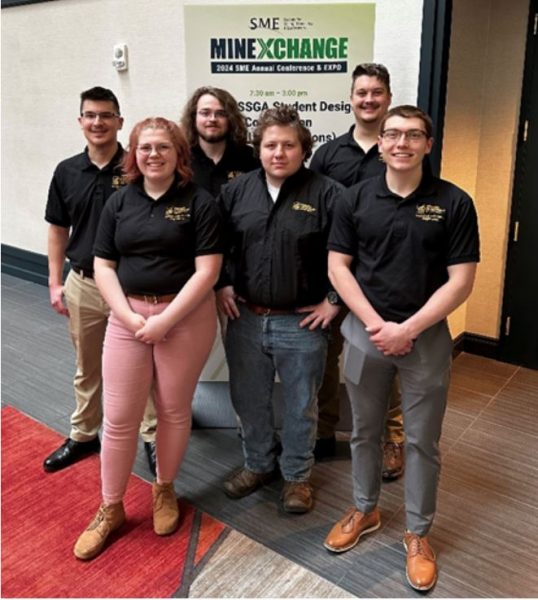
The interdisciplinary Michigan Tech team included mining engineering majors Aiden Harmon, Lucas Maxon, Ian Repic, Nathan Seidel, Grady Williams, and geological engineering junior Cassie Burch. “Under the expert guidance of Dr. Nathan Manser, Professor of Practice at GMES, the team has demonstrated exceptional skill and knowledge in their field,” said Aleksey Smirnov, Department of GMES Chair, who attended the conference. Although our team did not make it to the podium, the judges complimented the novelty of their design solutions.
On the research side, Associate Professor and a Witte Family Faculty Fellow in mining engineering, Dr. Snehamoy Chatterjee, delivered an oral presentation titled “Developing a Recourse Action to Survive Low Commodity Prices in Open Pit Mine Planning.” This research develops a recourse action strategy under an uncertain environment to revisit the mine production planning when metal prices decline.
Dr. Chatterjee’s Ph.D. student, Abid Danish, presented a talk titled “Enhancing Workplace Safety in the Mining Industry: A Data-Driven Approach through Unstructured Accident Narrative Analysis and Clustering.” He analyzed MSHA accident/injury data narratives using natural language models and unsupervised machine learning algorithms to understand the risks associated with mining accidents.
The GMES department co-sponsored and hosted an alumni engagement event. The two-hour social event was well-attended by alumni from several MTU departments, such as GMES, Chemical Engineering, Material Science and Engineering, and other programs and current MTU faculty and students. The event was a great opportunity for everyone to network and catch up with old friends. Overall, the alumni engagement event was a success, and plans for the next meeting in Denver are already underway. We are grateful to all the alumni who attended and look forward to seeing even more of them at future events. This year, the event was co-sponsored by the Department of Chemical Engineering.
Bravo, graduates! Here’s to your endless potential and the adventures awaiting in your future.
Degrees Awarded
Master of Science in Geological Engineering
Clayton H. Donajkowski
William T. Webster
Master of Science in Geology
Hayden M. Chaisson
Master of Science in Geophysics
Sunday Joseph
Aimee Zimmerman
Morgan Wilke
Master of Science in Mining Engineering
Emmanuel Wolubah
Alfred Yeboah
Enoch Nii-Okai
Bachelor of Science in Geological Engineering
Karina K. Constant
Braxton J. Murphy
Bachelor of Science in Applied Geophysics
Brendan Harville
Bachelor of Science in Mining Engineering
Ian G. Repic
Olivia K. Rouleau
Nathan J. Seidel
Maxx D. Tartamella
Award Recipients
AIPG National Student Scholarship – Natalie Sorensen
Outstanding GTA Award Spring ‘24 – Aimee Zimmerman
Outstanding GTA Award Fall ’23 – Dakota Locklear
Outstanding Scholarship Award Sp’24 – Morgan Wilke
Outstanding Scholarship Award Fall ‘23 – Ian Gannon
Department Scholar – Sam Jensen
Field Geophysics Spiroff Book Award – Clarissa Gordon
Field Geology Spiroff Book Award – Anton Smirnov
Summer Undergraduate Research Fellowship (SURF) – Sam Jensen
Estwig Rock Hammer Award – Max Stange
Certificate Graduates
Geoinformatics – Oluwatosin O. Ayo, Clayton H. Donajkowski, Sunday Joseph,
Ashish Mahaur, Eli A. Paulen, William T. Webster, Morgana M. Wilke, Emmanuel L. Wolubah
Natural Hazards & Disaster Risk Reduction – Hayden M. Chaisson, Ryan M. Cocke,
William T. Webster, Morgana M. Wilke
In a stunning display of ‘when it rains, it pours,’ Dr. Simon Carn, a Professor at the Department of GMES, has bagged two prestigious awards within a month—a feat as rare as spotting a double rainbow. On April 5, Dr. Carn was honored with the Michigan Tech Research Award, recognizing his outstanding achievements in research. Just weeks later, on April 18, he was bestowed the title of Distinguished Professor, an accolade awarded to faculty members who have made substantial contributions to the University and their discipline.
Dr. Carn has made seminal contributions to both applied and fundamental aspects of volcanology, remote sensing, and meteorology. Recognized as a world authority on multi-sensor remote sensing of volcanic clouds, he uniquely blends advanced knowledge of remote sensing, volcanology, and atmospheric science. His research is noted for its innovation, collaborative spirit, and versatility, focusing on employing remote sensing data in studies of volcanic degassing, eruption clouds, and anthropogenic pollution. Dr. Carn excels in translating theoretical understanding into practical solutions, significantly impacting volcanic hazard prediction and mitigation and enhancing aviation safety. This blend of academic and practical prowess has earned him broad international recognition, including the American Meteorological Society Special Award and the NASA/US DOI William T. Pecora Award.
Dr. Carn has secured substantial external funding to support his research, with contributions from prestigious agencies such as NASA, NSF, and NOAA, underscoring the scientific community’s strong confidence in his work. His external expenditure ranks among the highest at MTU. His scholarly output is both prolific and collaborative, featuring 133 peer-reviewed publications and book chapters, many co-authored with his students. He is also among the most cited researchers at the university.
An inspiring mentor and instructor, Dr. Carn has guided four postdoctoral researchers, 22 PhD and 36 MS students. He led our successful dual International Master in Geology (INVOGE) program from 2009 to 2015 in collaboration with Université Blaise Pascal, the University of Buffalo, and the University of Milan Bicocca. His students have found employment in the public, government, and academia worldwide.
Dr. Carn has made significant contributions to his professional community, serving as an Associate Editor for the Journal of Geophysical Research and as Secretary of the Remote Sensing Commission of the International Association of Volcanology and Chemistry of the Earth’s Interior (IAVCEI) since 2008. Additionally, he has been a member of the National Academy of Sciences Committee on Improving Understanding of Volcanic Eruptions, the AAAS Review Committee for the U.S. Geological Survey Volcanic Hazards Program, and various scientific committees for international conferences and workshops.
Importantly, Dr. Carn has been very active and efficient in outreach and promotion of science. He is a frequent and long-term contributor to NASA’s Earth Observatory educational website and other outlets such as Scientific American and National Geographic. He conducted TV, radio, and newspaper interviews with BBC World Service, The Weather Channel, Wall Street Journal, Weather Underground, and others. Finally, he has actively promoted his research on X (formerly Twitter) with more than 7000 followers as of today.
Congratulations, Simon, on these well-deserved awards!
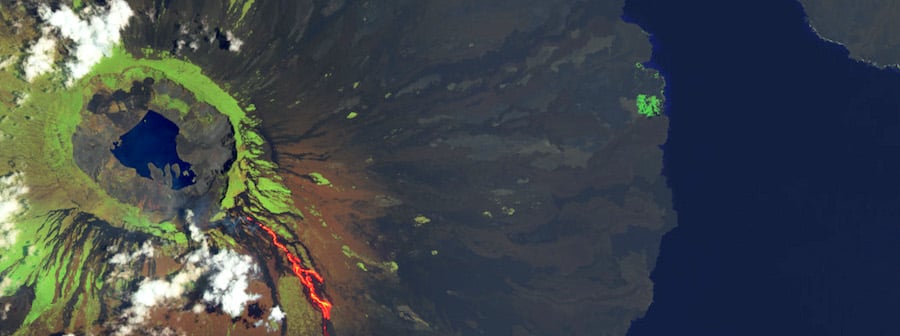
Simon Carn (GMES) was quoted by NASA Earth Observatory in a story about an eruption of the La Cumbre volcano in the Galápagos islands. The eruption began March 2 on Fernandina Island, and the story included a March 7 aerial image showing continued active lava flow.
“This is typical of lava-producing effusive eruptions, which usually show peak emissions early on followed by a steady decline towards the end of the eruption.”
Carn’s research includes using satellite measurements to constrain global volcanic SO2 production and emissions from individual volcanoes.


